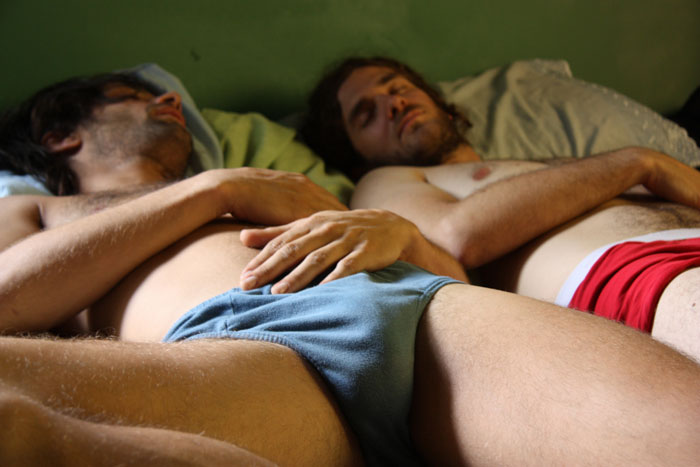 The Argentinian Queers Are More Than All Right The Argentinian Queers Are More Than All Right
Plan B
directed
by Marco Berger
Plans change. We all know this.
But what happens when your intention to be straight, to win back your ex, to be heterosexual, is interrupted?
Even if this film by Argentinian director Marco Berger chews on a queer cliché, I’d watch it again and recommend it to my friends.
“There’s something I don’t understand. All of a sudden you like guys?”
Yes, all of a sudden. All of a sudden the boy is queer. It doesn’t have to be from birth. It doesn’t have to be in line with the gay political agenda.
It can happen one day, unexpectedly, and change all your plans. It can even change back again!
Plan B is about two boys and queerness. I say “boys” intentionally (and queer too!),
because in Plan B a lot of what we see is two boys who haven’t yet arrived at manhood, swimming in a friendship they haven’t
had since they were 12. And by “queer” I mean to signify a fluid, unfixed, sexual orientation (what’s sexy is on a spectrum and not in a box).
Bruno spots the new boyfriend of his ex-girlfriend.
Plan A is to win his ex-girlfriend back with sex. When that doesn’t succeed, plan B is to steal her new boyfriend away
through seduction. Perhaps bisexuality shouldn’t come, or be represented, so loosely. But in this film it is, and that’s A-OK with me.
As the film proceeds, we see incredibly attractive men reminiscing about the loss of their boyhood.
“Remember when we were 12 and we used to have sleepovers with our friends and talk all night long?”
Rather than the oft-tragic representations of gayness, this film shows men mostly sad about growing up.
And why shouldn’t they feel nostalgic for their boyhoods when adult masculinity leaves so little room for guy-to-guy intimacy?
Bruno (Manuel Vignau) and Pablo’s (Lucas Ferraro) relationship is built on childlike conversations, the content leftover from youth:
toys, an in-depth analysis of Never-Neverland. The sweetness (or stoned-ness) of this dialogue intermixes with silent,
still, too-long shots of mid-20something boys with huge bulges, asleep, in tight underwear. In typical queer film fashion,
we are asked to wait in suspense for the boys, who in the end may or may not be straight, to suck it up and make love.
The film takes place in prototypically queer in-between spaces: hallways, doorways –– the boys take a while to decide about landing on each other.
When it comes to queer film, I will add Plan B to my list of favorites.
I would endure its clichés and imperfections, too-long shots and sometimes over-stylized realism for the entertaining
free-association dialogue, the likeability of its content, its gorgeous actors, and finally for the fact that it “gets”
white boy queer pretty well: the fluidity and changeability of sexual desire, the often fuzzy lines of friendship and lover,
as well as the blurry Never Land between the memory of youth and the enactment of adult love.
––
Sofia Rose Smith
|